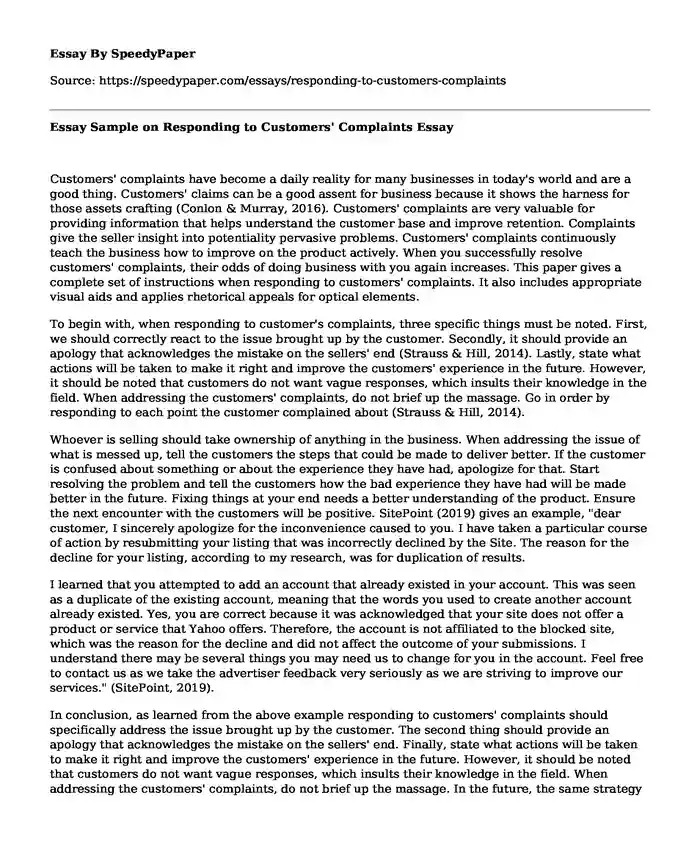
| Type of paper: | Essay |
| Categories: | Business communication Conflict management Customer service |
| Pages: | 3 |
| Wordcount: | 666 words |
Customers' complaints have become a daily reality for many businesses in today's world and are a good thing. Customers' claims can be a good assent for business because it shows the harness for those assets crafting (Conlon & Murray, 2016). Customers' complaints are very valuable for providing information that helps understand the customer base and improve retention. Complaints give the seller insight into potentiality pervasive problems. Customers' complaints continuously teach the business how to improve on the product actively. When you successfully resolve customers' complaints, their odds of doing business with you again increases. This paper gives a complete set of instructions when responding to customers' complaints. It also includes appropriate visual aids and applies rhetorical appeals for optical elements.
To begin with, when responding to customer's complaints, three specific things must be noted. First, we should correctly react to the issue brought up by the customer. Secondly, it should provide an apology that acknowledges the mistake on the sellers' end (Strauss & Hill, 2014). Lastly, state what actions will be taken to make it right and improve the customers' experience in the future. However, it should be noted that customers do not want vague responses, which insults their knowledge in the field. When addressing the customers' complaints, do not brief up the massage. Go in order by responding to each point the customer complained about (Strauss & Hill, 2014).
Whoever is selling should take ownership of anything in the business. When addressing the issue of what is messed up, tell the customers the steps that could be made to deliver better. If the customer is confused about something or about the experience they have had, apologize for that. Start resolving the problem and tell the customers how the bad experience they have had will be made better in the future. Fixing things at your end needs a better understanding of the product. Ensure the next encounter with the customers will be positive. SitePoint (2019) gives an example, "dear customer, I sincerely apologize for the inconvenience caused to you. I have taken a particular course of action by resubmitting your listing that was incorrectly declined by the Site. The reason for the decline for your listing, according to my research, was for duplication of results.
I learned that you attempted to add an account that already existed in your account. This was seen as a duplicate of the existing account, meaning that the words you used to create another account already existed. Yes, you are correct because it was acknowledged that your site does not offer a product or service that Yahoo offers. Therefore, the account is not affiliated to the blocked site, which was the reason for the decline and did not affect the outcome of your submissions. I understand there may be several things you may need us to change for you in the account. Feel free to contact us as we take the advertiser feedback very seriously as we are striving to improve our services." (SitePoint, 2019).
In conclusion, as learned from the above example responding to customers' complaints should specifically address the issue brought up by the customer. The second thing should provide an apology that acknowledges the mistake on the sellers' end. Finally, state what actions will be taken to make it right and improve the customers' experience in the future. However, it should be noted that customers do not want vague responses, which insults their knowledge in the field. When addressing the customers' complaints, do not brief up the massage. In the future, the same strategy can be used to respond to customers' complaints.
References
Conlon, D. E., & Murray, N. M. (2016). Customer perceptions of corporate responses to product complaints: The role of explanations. Academy of management journal, 39(4), 1040-1056.
SitePoint. (2019). How to Write a Good Response to a Client/Customer Complaint - SitePoint. [online] Available at: https://www.sitepoint.com/how-to-write-a-good-response-to-a-clientcustomer-complaint/ [Accessed 8 Dec. 2019].
Strauss, J., & Hill, D. J. (2014). Consumer complaints by exploratory investigation of corporate responses and customer reactions. Journal of Interactive Marketing, 15(1), 63-73.
Cite this page
Essay Sample on Responding to Customers' Complaints. (2023, Mar 14). Retrieved from https://speedypaper.net/essays/responding-to-customers-complaints
Request Removal
If you are the original author of this essay and no longer wish to have it published on the SpeedyPaper website, please click below to request its removal:
- Essay Example: Barricades and Borders Summary
- Paper Example on Evidence-Based Practice in Nursing
- Free Essay Sample on Software-Defined Storage
- Essay Example with a Movie Review for Breakfast Club
- Essay Example on Creating Effective Web Communications
- Paper Example: Personal Craziness Index (PCI)
- Revolutionizing Healthcare Project Management: A Comprehensive Analysis of Modern Tools
Popular categories




